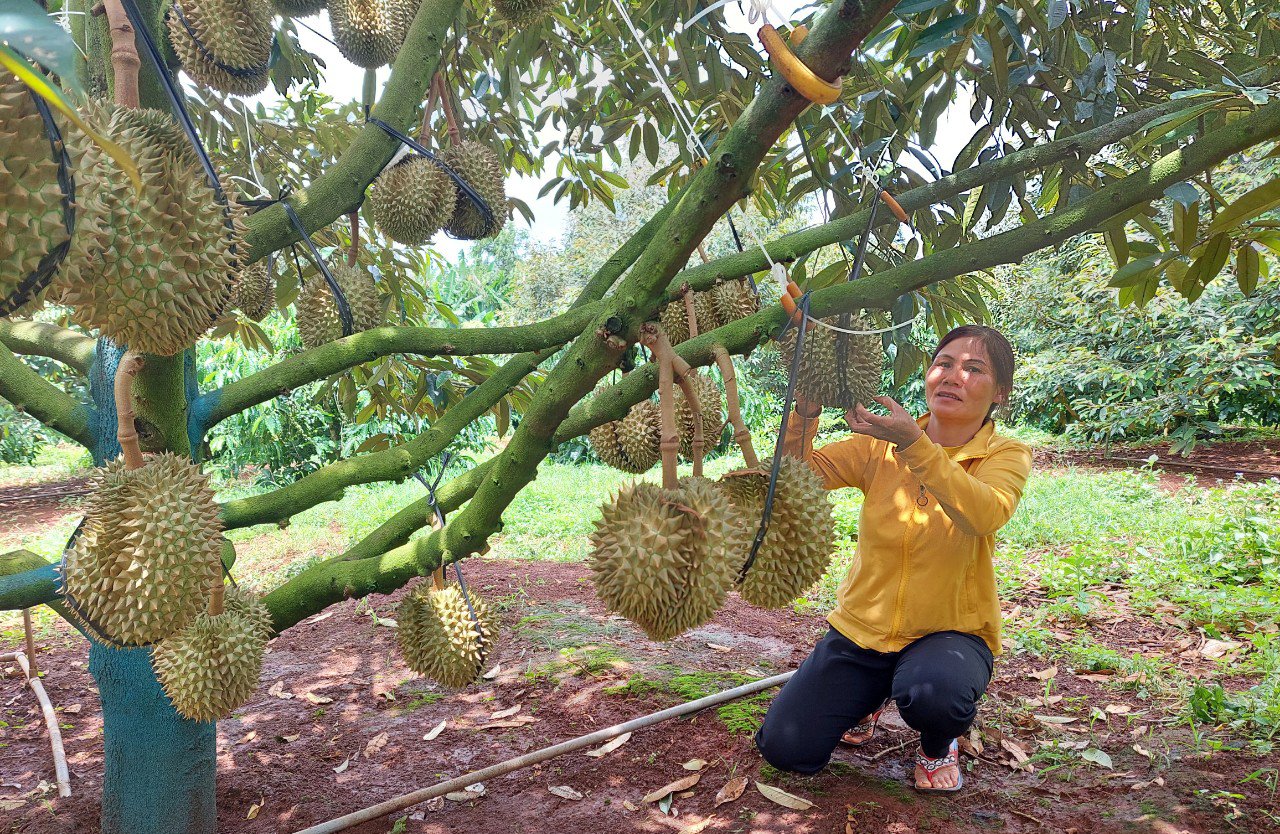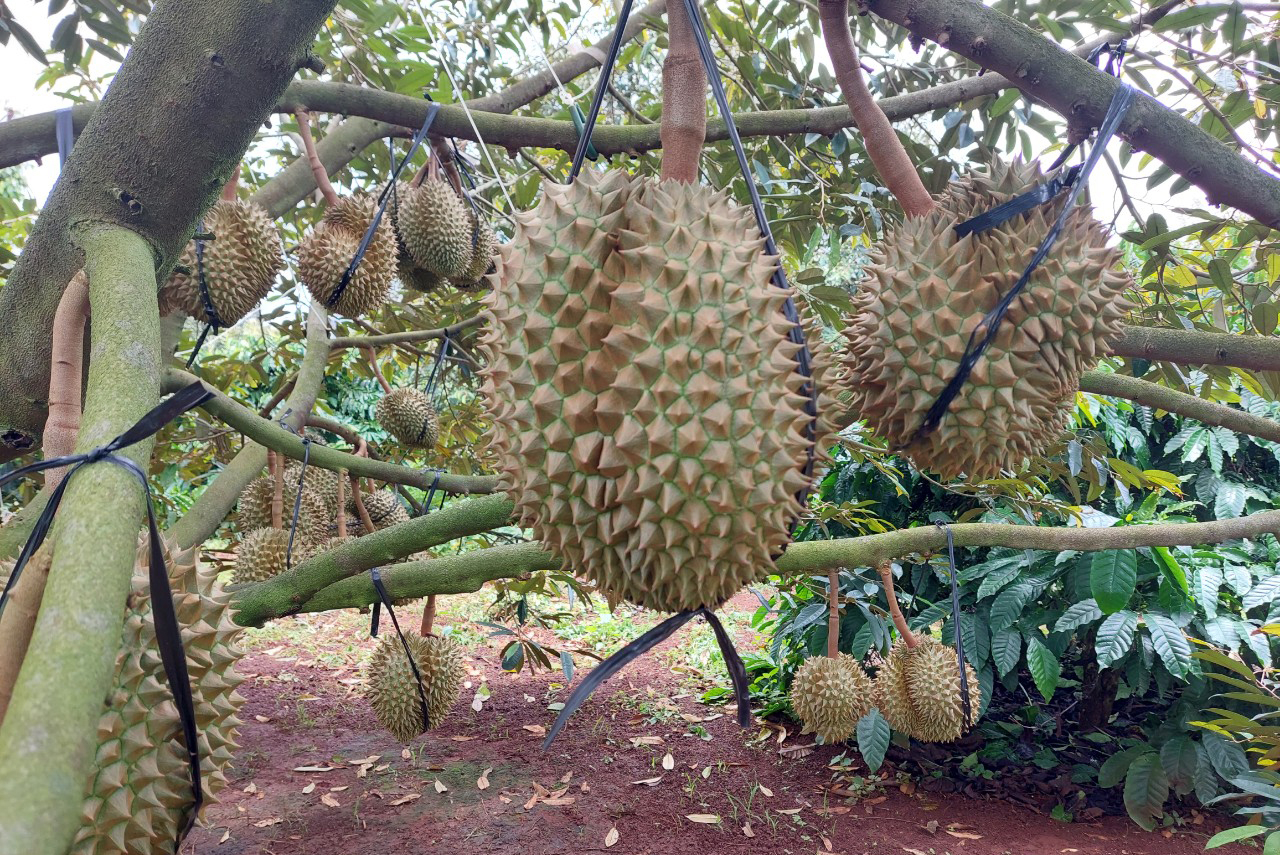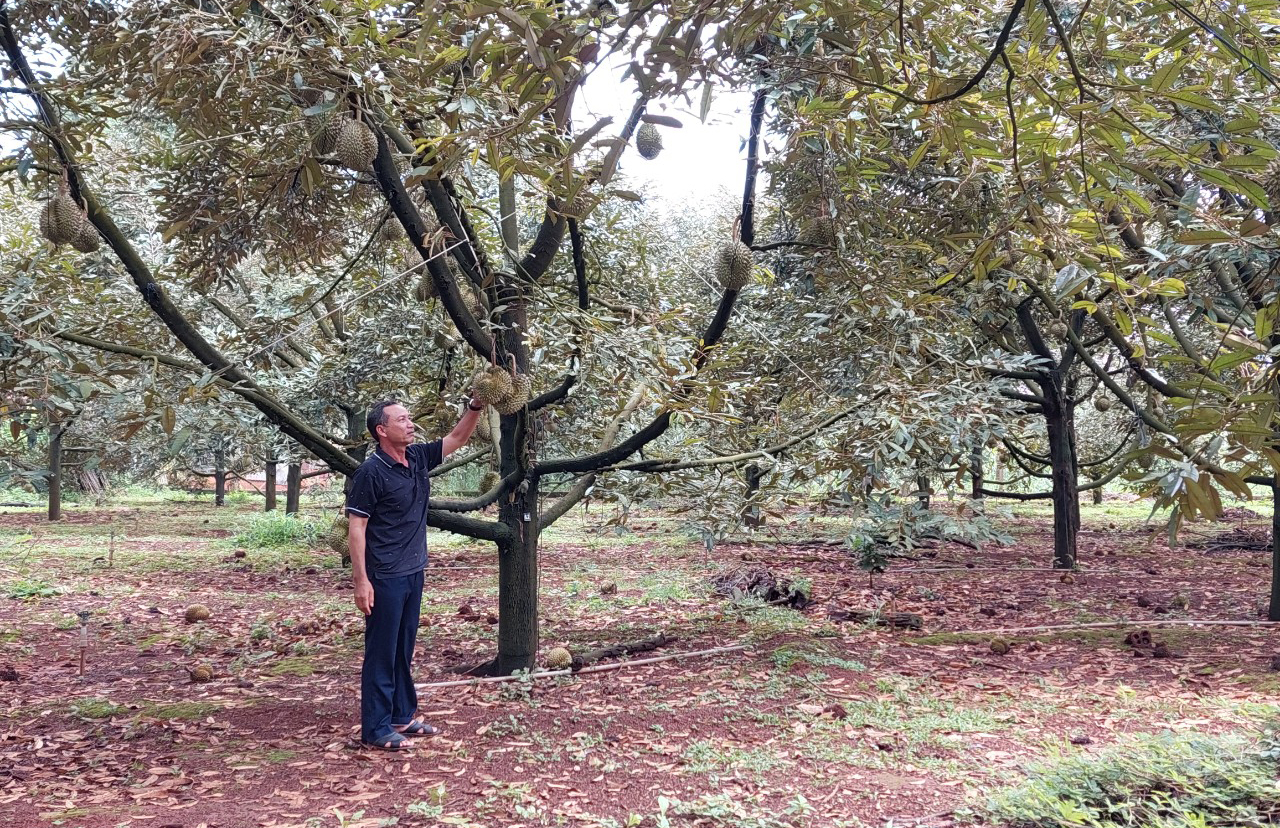May 29, 2025 | 15:18 GMT +7
May 29, 2025 | 15:18 GMT +7
Hotline: 0913.378.918
May 29, 2025 | 15:18 GMT +7
Hotline: 0913.378.918
Dak Lak durian is about to enter harvest, which is also the time for traders and businesses to lock in prices right at the garden. Dak Lak durian prices are being pushed up by traders and businesses to over VND 80,000/kg depending on the garden’s condition.
Selling at a high price means that farmers get profits. However, the price of durian is currently "blown up” to a rate much higher than the real demand of the market, which may lead to consequences, and farmers will be the ones to suffer.
Now it is not difficult to see brokers coming to the durian garden of farmers of Dak Lak province to see the garden and lock in a price. According to a broker who was looking for a garden to offer price lock in Ea Tar commune, Cu M'gar district, through connections he is able to contact Chinese traders. This person along with 2 other people then finds the durian garden to make deals with local farmers. The price lock offered by this group ranges from VND 73,000 to VND 84,000/kg.
“We just need the fruit to look good. Any diseased or twist-shaped durians will be discarded. We come for introduction, then farmers would work directly with Chinese traders. We have closed deals for a total of more than 500 tons of durian. Doing this job, we are entitled to a commission of VND 1,000 per kg. We only lock in the price for Chinese traders, but we do not know specifically what company," the broker said.
Tran Thi Tuoi's family (Ea Tar commune) has 2 ha of durian, which is expected to yield more than 20 tons. Recently, the family constantly get calls from brokers asking to lock in the garden. The family just opens the garden door, and many brokers would come in, eager to make a deposit.
“There are a lot of brokers. They bid over VND 80,000/kg and are willing to deposit 40%. However, our family is a member of the cooperative, so I give priority to selling to the cooperative at the price of VND 68,000/kg, which is already enough to make a profit.”

Tuoi’s family signs a contract with the cooperative to sell durian at a price of VND 68,000/kg, while other families in the area sell to outsiders for over VND 80,000/ kg. Photo: Quang Yen.
Bui Thu Phuong, Director of Tan Khang Sustainable Agriculture, Trade and Service Cooperative, said that many brokers and traders come to local people's gardens to lock in prices above VND 80,000/kg in the form of “buying in bulk”. In fact, there are many land brokers who switch to becoming durian brokers without any knowledge of the business but still blow up the price of durian to VND 75,000 - 85,000/kg and buy in bulk instead of classifying the products.
“Many big companies come to drop deposits, but the contract signed with local farmers normally do not have many binding terms. There is no specific cutting date, only stating that when the fruit falls, the company would cut it. The contract also does not mention the time frame for cutting phases 1, 2,3, or how many days the company will return the garden. The cooperative gives out a lot of warnings, even showing evidence recently in Binh Phuoc, Dong Nai when durian garden was 'anchored', no fruit was cut, causing great damage,” said Director Phuong.
From the cooperative director’s perspective, people soon close the deal after seeing the high price because they are the ones who run after immediate benefit. Even when the gardens lock in the price and receive a deposit from this one business, when the latter pays a higher price, farmers are willing to return the deposit.

In many cases, durian farmers cancel deposits with businesses when being paid a higher price by the latter. Photo: Quang Yen.
The situation of "selling" young durian gardens has appeared for many years in many forms. After the two sides finalize the sale price, the trader places a deposit and takes care of the garden until the fruits are harvested and collected, then returns the garden to its owner. There are also cases where traders only deposit money and receive the products but do not take care of the garden.
According to many households who used to choose this method, after locking in the price, buyers often used too much chemical fertilizers and pesticides to stimulate the fruit, causing the trees to be depleted, shortening their lifespan, and reducing the yield in the next crop.
Nguyen Ngoc Giao, Head of the Office of Agriculture and Rural Development of Cu M'gar district, said “We appreciate the fact that traders come to visit the garden and offer purchase, which in a way form a consumption link chain. However, the situation of traders in other places coming to Cu M'gar district to buy durians at high prices caused market disturbances. If farmers do not stay alert, there will be a competition to buy and sell, violating the signed contract”.

District-level authorities in Dak Lak province advise people to carefully review the terms of the deposit contract to avoid potential losses. Photo: Quang Yen.
For fruits, the harvest period is of utmost importance. Ripe durian will soon be damaged without a buyer coming to help with consumption. Facing this situation, the district’s agricultural sector has given out warnings to stabilize the value chain, asking people to be wary of traders blowing up durian prices. “Breaking the link chain just because of the uncertainty of market prices, and farmers will not be able to produce sustainably. Affiliated businesses also need to make sure that they conduct trades at market prices,” said Giao.
Translated by Samuel Pham

(VAN) Ms. Nguyen Thi Dung, Deputy Director of Ngoc Hoang Cooperative, shared about the journey of bringing dragon fruit to Europe, achieving annual revenues in the billions of VND.

(VAN) Bamboo products from Thang Tho Bamboo Cooperative have reached many countries around the world, while also creating jobs for local workers.

(VAN) The Management Board of Con Dao National Park reported that a green sea turtle, tagged in the Philippines, has traveled thousands of kilometers to lay 84 eggs on Bay Canh Islet.

(VAN) Green technology is paving a new path for sustainable aquaculture in the Mekong Delta in particular and across the country in general, helping reduce emissions and adapt to climate change.

(VAN) On May 27, La French Tech Vietnam (the French startup and innovation community in Vietnam) held the French Tech Summit Vietnam 2025.
/2025/05/27/4731-2-223159_980.jpg)
(VAN) No votive paper, no styrofoam, no plastic bags, no plastic bottles, and no single-use plastic trays are the key rules tourists should keep in mind when visiting Con Dao.

(VAN) In the fight against plastic pollution, Vietnam has been demonstrating a proactive, pioneering, and active role in addressing the greatest environmental challenge today.